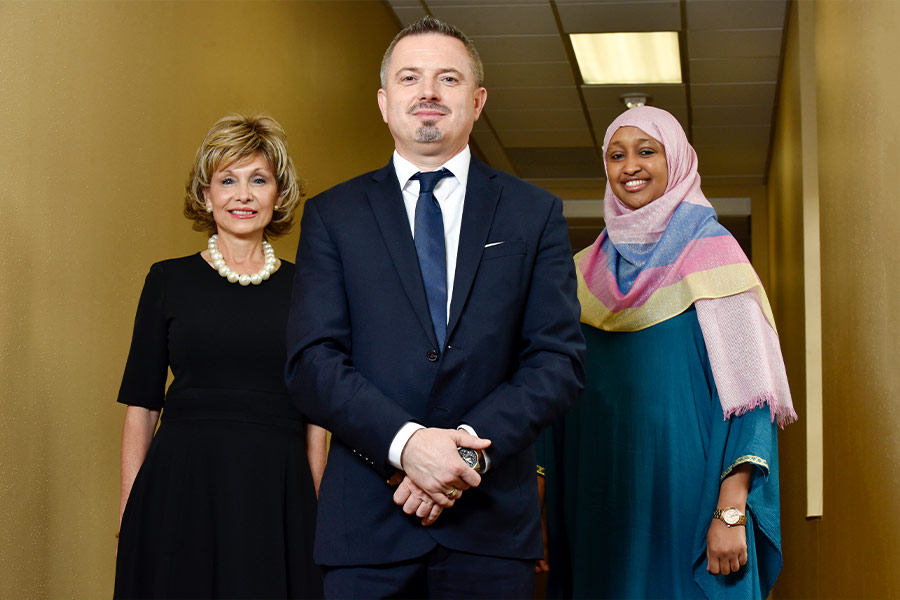Taking the cake: Catholic Charities Fort Worth celebrates 110 years of helping the community

Christopher Plumlee has hosted several Know Poverty tours of Catholic Charities Fort Worth. The reaction is always the same.
“Every time, they shake their heads and say, ‘Holy cow!’ They are blown away by all the things we are doing,” said the chairperson of the nonprofit’s Board of Directors, who is pleased to show firsthand the scope of CCFW’s mission and the many ways volunteers can support it.
This spring, the organization celebrated 110 years of sustaining its mission: to serve those in need, to advocate for compassion and justice in the structures of society, and to call others of good will to do the same.
The charity began on St. Patrick’s Day of 1910, when a group of ladies approached Bishop Edward Dunne on the steps of St. Patrick Cathedral and requested permission to begin an “act of mercy.” In those early years, the women sold their handmade crafts at the State Fair of Texas, and then used those proceeds to give $1 or $2 to those who came to the church office requesting assistance.
That business model worked a century ago, but it has changed with the times. Michael Grace, the president of CCFW, noted that the organization has gone through many life cycles during its existence, responding to the needs of the community during each particular era.
For example, during the Great Depression, volunteers stepped forward and opened St. Teresa’s Home to provide shelter and education to an increasing number of homeless children.
Following the Vietnam War, CCFW began refugee services programs to help the great numbers of families fleeing Southeast Asia to seek safety in the U.S.
Today, according to Grace, the nonprofit has pivoted to be more proactive in its focus, seeking what can be done to solve the problem of poverty, and not just reacting to the symptoms of poverty.
Grace said, “The key differentiator is that a lot of nonprofits are crisis-centered. They are dealing with people in crisis mode — they are homeless and they are hungry. We are more holistic in our approach. We look at the long-term strategy that can be deployed to break the cycle of these needs. We are more long-term case management driven.”
Replicable Results
CCFW, which has earned nine consecutive four-star ratings from Charity Navigator, has several unique programs that set it apart from other Catholic Charities organizations across the country.
First and foremost, the efforts to end poverty are research driven.
The organization has partnered with the Wilson Sheehan Lab for Economic Opportunities research team at the University of Notre Dame to evaluate and research its poverty programs. Plus, CCFW uses an internal research team to plan and monitor its work to determine what is effective and how to most responsibly use the nonprofit’s resources.
The results? The value of research, both internal and external, is that the successes at CCFW are known and can be replicated for future local clients and at other Catholic Charities.
Studies have shown that one of the most successful pilots has been Stay the Course, which partners economically disadvantaged community college students with a navigator who helps each student overcome his individual obstacles. Stay the Course students are four times more likely to graduate than those who don’t receive the service.
“We’ve learned a lot [from research]. There are ways to solve poverty. However, it’s very expensive, and it’s very financial-capital and human-capital intensive,” said Grace, who noted that a CCFW case manager might work with 30 clients, whereas a government case worker might manage ten times as many.
A Win-Win-Win Situation
Determining a community need and responding to it is a win for those in privation.
But CCFW has created four social enterprises that multiply the win.

Darlene Irey, sales executive; Meti Dibra, director; and Deqo Hassan, interpreter and translator, are part of CCFW’s Translation & Interpretation Network. (NTC/Ben Torres)
For example, the Translation & Interpretation Network. Created about 20 years ago, it provides much needed language services to schools, employers, hospitals, and the judicial system, among other clients. First win: for the community who needs professional translation services, by phone, video, or in person.
Second win: the network employs immigrants and refugees to translate. Last year, about 400 individuals provided translation and interpretation services, in almost 200 languages, and they earned wages totaling about $2 million. For many, Translation & Interpretation Network is their first job in the U.S. and a bridge to future full-time, permanent employment elsewhere.
And the third win puts it over the top. The network has clients around the nation, who find the services through its website, TINtranslation.com. The social enterprise has been profitable since its earliest days, and those profits go back into CCFW. In 2019, TIN netted $370,000 that CCFW put back into its poverty solutions.
CCFW’s other social enterprises are a dental clinic, immigration services, and a transportation program that provides more than 80,000 rides each year.
Grace said that 20 to 25 percent of the nonprofit’s revenue stream comes from its social enterprises, and he hopes to expand into other sectors in the future, which would provide more of the financial capital necessary to increase its reach in the community.
Like the research-based programs, social enterprises have proven to be replicable elsewhere. Meti Dibra, senior director of Translation & Interpretation Network, said CCFW has assisted other Catholic Charities in establishing similar services. Alternately, some locations have chosen to provide translators in their respective regions, but they use CCFW for ongoing business support behind the scenes.
Dibra helped launch the service 20 years ago, and he has been delighted to see the enterprise flourish. “We were that little program that was looking outside of the box, and I’m so proud to be part of the process and the evolvement of CCFW. So proud,” he emphasized.
Fishing Lessons
Christopher Plumlee, who has served on CCFW’s board for five years, compares the nonprofit’s current strategy to a fishing lesson.
“We’re really not trying to give someone a fish. For us, we’re really trying to teach people how to fish” so that they can eat for a lifetime. “It’s not, ‘Here’s a fish, good luck, and God bless,’” said Plumlee, the president of Elevate Strategy Group, a business management consulting company.
Treating the symptoms of poverty, which most nonprofits do, is good and necessary, Plumlee quickly pointed out. But he has observed that CCFW meets clients where they are and addresses their underlying issues, for the ultimate goal of lifting clients out of poverty.
“We have an audacious goal of lifting 10,000 families out of poverty permanently,” he said. Specifically, CCFW wants its clients to have skills to secure a job that pays a living wage; to obtain permanent housing; to be able to care for the family for a lifetime; and to eliminate pernicious debt.
According to Plumlee, “If you come through Catholic Charities’ doors with a will, a focus, and a commitment to lifting your family out of poverty, we will give you the tools and resources to get there.”
Tonita Burbage exemplifies that strategy. When she contacted CCFW, Burbage had a part-time job that didn’t provide the cost of living for the single mother and her two daughters. She admitted she “felt worthless” and was nervous.
The team at CCFW started by helping her with her interview and resume skills and provided some gently used interview clothing.
Even after she acquired a full-time job, she met with her case worker twice a month. One by one, she checked off her goals. She paid off her car, then she accumulated enough savings to make a down payment on a new home.
“They built my confidence back up,” she said. “They helped me stay focused, set goals, and meet them. Now I know I can do anything if I put my mind to it.”
The Catholic Ladies Aid Society, as Catholic Charities Fort Worth was known in its beginning, could not have conceived the social enterprises or research-based programs that Catholic Charities employs to help lift families out of poverty. However, the heart, effort, and mission remain as the nonprofit looks forward to its next milestone.
